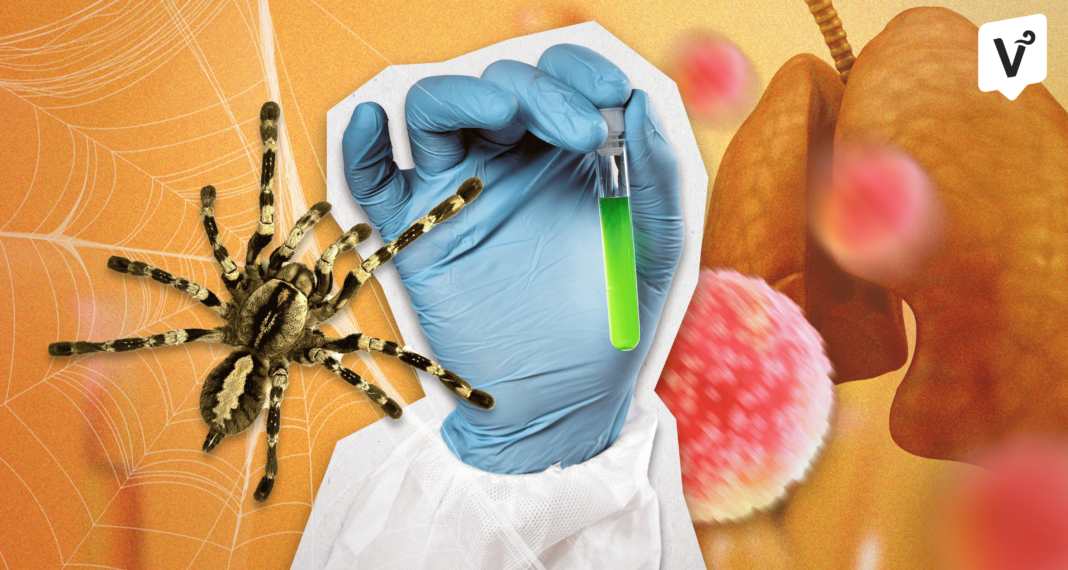RESEARCHERS have been eyeing a possible cure for lung cancer – the deadliest type of cancer in the Philippines – by experimenting with an unusual chemical: the venom of a spider.
People assume that most species of spiders possess toxic venom – a combination of chemicals used to kill insects or ingest liquids – that could lead to death when inserted into humans through a bite.
In fact, only 30 out of more than 43,000 species have been responsible for human deaths, according to the Britannica Encyclopedia. Most spider bites only result in allergic infections and are far from emerging as a threat to public health, based on research by Iranian scholars in 2014.
Hidden inside the composition of spider venom are peptides – a molecule that contains two amino acids – that could kill cancer cells and be attractive to cancer treatments.
In 2020, UST researchers already found that the venom’s peptide toxins could help aid breast cancer by “producing lethal effects on tumor cells.”
This time, a new set of researchers has been exploring how the venom from tarantulas could effectively target lung cancer, which has claimed the lives of about 96 Filipinos daily, according to a study last year by the Philippine Society of Medical Oncology.
Asst. Prof. Maria Salvacion Esmalla, a faculty member at the UST Department of Biochemistry who helped lead the project, chose tarantulas because of their ubiquity in the Philippines, which could avert supply problems once the venom becomes a potential ingredient for a life-saving drug.
“[The tarantula] has a lot of potentials, such as anti-inflammatory and anti-neuro-modulatory activities,” she told the Varsitarian. “They harbor a wealth of physiological functions that could alter the possible metabolic pathway depending on what specialization you want to look at.”
“It’s like drugs that are being developed because they’re especially safe. That’s why we also perform other in vitro acids, so I think it will take some time, but at least we’re opening some possibilities for that.”
The study, titled “Investigation of spider venom derived cell-penetrating peptides: evaluation of cellular uptake, cytotoxicity and apoptotic effects in A549 lung carcinoma cells,” won first place in a research poster presentation under the health and wellness category during the 50th Philippine Society of Biochemistry and Molecular Biology Annual Convention at the Manila Hotel.
Results showed that synthesized peptides from tarantula venom registered an 83.17-percent apoptotic rate to A549 lung cancer cells (the most commonly researched cell line), which means that the venom produced chemicals to program the cells to self-destruct.
These findings suggest that the tarantula venom could potentially be used as a targeted therapy for lung cancer and other diseases in the future, offering hope for improved treatment options.
“I think for the past three years, there have been some studies that show that the spider genome peptides express some potential activity against, let’s say, Alzheimer’s disease or any neurodegenerative-related diseases,” Esmalla said.
For the biochemist, the revolutionizing aspect of the study is the development of targeted drug delivery, a modern method used to increase the concentration of the medication by releasing it directly into the organ, tissue, or cell.
“It could be a good framework for personalized medicine, depending on the actual individual case-to-case basis of the patient,” the faculty member said. “It’s possible that you have personalized medicine that’s not only limited to cancer, but also to other diseases, such as Alzheimer’s disease, dementia, or its anti-inflammatory activity.”
Researchers, Esmalla urged, must exercise curiousness to develop studies that are out of the ordinary.
“By thinking outside the box and embracing collaboration, we can unlock the full potential of spider venom peptides and revolutionize cancer treatment for generations to come,” she said.
Biochemistry graduates Dustine Faye Baluran and Angel Madelyn Candelaria conducted the research under the guidance of Department of Biochemistry faculty members Esmalla, Asst. Prof. Leonardo Guevarra and Assoc. Prof. Myla Santiago-Bautista.














